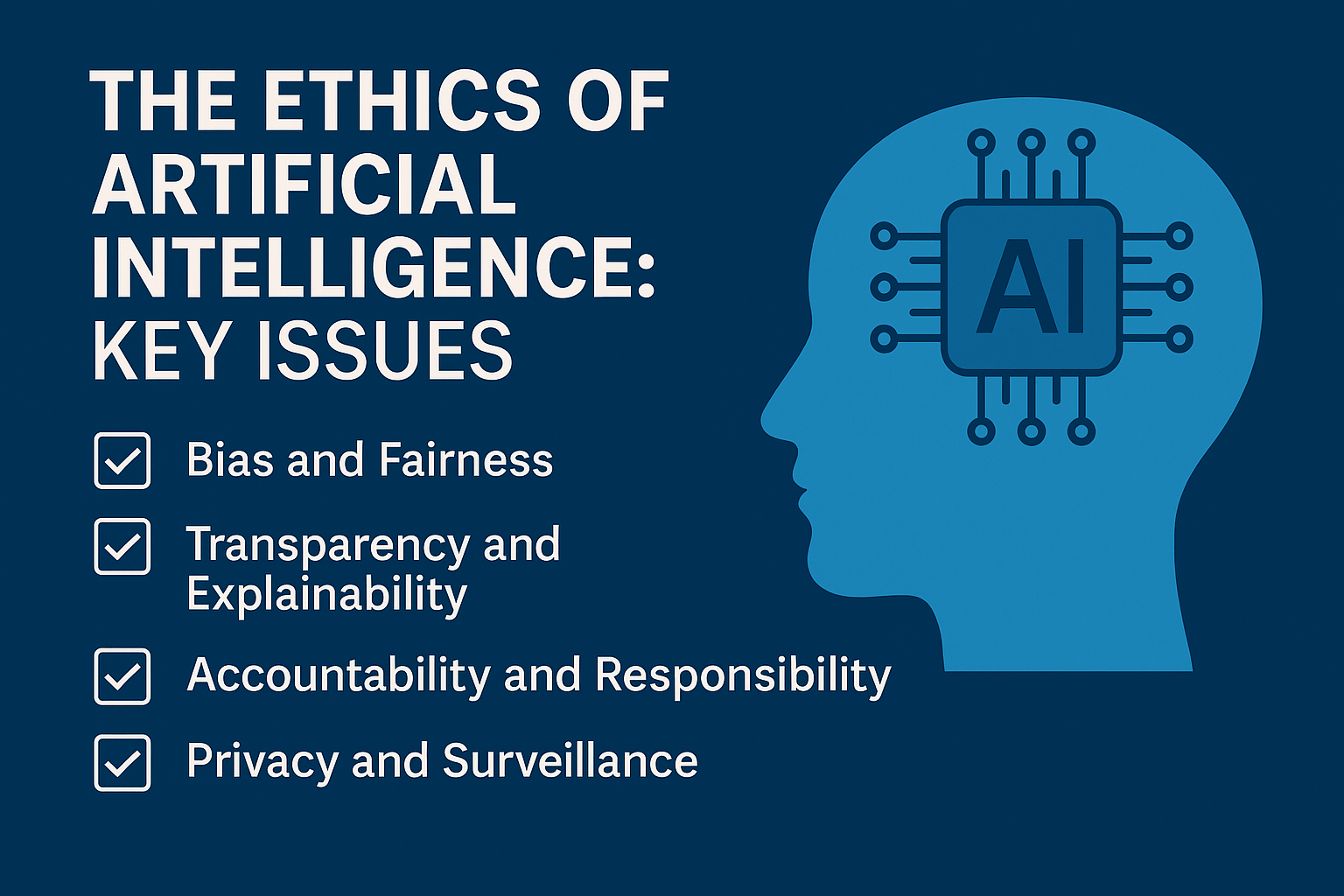As Artificial Intelligence (AI) becomes more integrated into daily life — from healthcare and finance to transportation and communication — its ethical implications are taking center stage. While AI offers powerful tools to improve productivity and solve complex problems, it also raises serious questions about responsibility, fairness, and transparency.
In this article, we’ll explore the key ethical issues surrounding AI, why they matter, and how we can build a future where intelligent systems benefit everyone — not just a privileged few.
Why AI Ethics Matters
AI systems can make decisions that affect:
- Who gets hired
- Who qualifies for a loan
- What content gets promoted online
- How people are monitored or policed
If these systems are biased, opaque, or poorly designed, they can cause real-world harm. Ethical AI is about maximizing benefit while minimizing harm — both intentionally and unintentionally.
1. Bias and Fairness
The Issue:
AI learns from data — and if that data contains historical or social biases, the AI will replicate or even amplify them.
Examples:
- Facial recognition software misidentifying people of color
- AI hiring tools favoring certain genders or names
- Predictive policing disproportionately targeting minority communities
Ethical Solution:
- Use diverse, balanced datasets
- Audit algorithms for bias regularly
- Involve multidisciplinary teams in model development
2. Transparency and Explainability
The Issue:
Many AI systems are “black boxes” — they make decisions, but even developers don’t fully understand how.
Why It Matters:
- Users need to trust AI decisions, especially in high-stakes contexts (e.g., medical diagnosis).
- People should know why they were approved or rejected for something.
Ethical Solution:
- Develop interpretable models when possible
- Provide explainable AI (XAI) interfaces
- Share model logic in plain language with users
3. Accountability and Responsibility
The Issue:
If an AI makes a harmful decision, who is responsible? The developer? The company? The AI?
Real-World Examples:
- Self-driving car accidents
- AI financial advisors recommending risky trades
- Chatbots giving dangerous medical advice
Ethical Solution:
- Create clear governance structures
- Assign legal liability to human decision-makers
- Use human-in-the-loop systems for final approval
4. Privacy and Surveillance
The Issue:
AI often relies on massive data collection — including sensitive personal information.
Ethical Dilemmas:
- Is it ethical to monitor employee productivity with AI?
- Can facial recognition be used in public without consent?
- Should children’s behavior be tracked by AI in classrooms?
Ethical Solution:
- Prioritize data minimization and encryption
- Allow users to opt in or out of tracking
- Follow regulations like GDPR and CCPA
5. Autonomy and Consent
The Issue:
AI can influence decisions, behavior, and even beliefs — often subtly.
Examples:
- Recommendation algorithms shaping political views
- Emotion AI detecting moods and adjusting ads
- AI-driven nudges changing consumer behavior
Ethical Solution:
- Ensure users are aware when AI is being used
- Get informed consent for personal data use
- Offer opt-outs and alternatives
6. Job Displacement and Economic Inequality
The Issue:
AI and automation are replacing certain jobs faster than new ones are being created.
Concerns:
- Will entire sectors become obsolete?
- Will only tech elites benefit from AI?
- How do we support displaced workers?
Ethical Solution:
- Invest in reskilling programs
- Promote inclusive AI entrepreneurship
- Implement universal basic income or other support models
7. Weaponization and Misuse
The Issue:
AI can be weaponized — in both literal (military) and digital (disinformation) ways.
Risks:
- Autonomous drones or lethal robots
- Deepfakes spreading misinformation
- AI malware evolving faster than defenses
Ethical Solution:
- Ban autonomous lethal weapons globally
- Build detection tools for AI-generated disinformation
- Foster international cooperation on AI safety
Principles for Ethical AI
Organizations like UNESCO, the EU, and AI ethics researchers propose shared values to guide AI development:
- Fairness
- Transparency
- Accountability
- Privacy
- Inclusivity
- Sustainability
Developers and companies are encouraged to embed these values into every stage — from data collection to deployment.
Final Thoughts: A Moral Compass for the Machine Age
AI has the potential to reshape the world — but whether it becomes a force for equality or inequality, freedom or control, depends on the ethical decisions we make today.
By embracing a culture of responsibility, openness, and empathy, we can ensure that AI serves humanity — not just the interests of a few. Ethical AI isn’t a side conversation — it’s a core requirement for building a fairer, safer, and smarter future.
